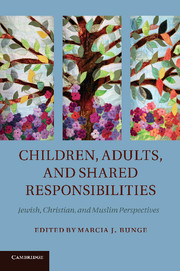Book contents
- Frontmatter
- Contents
- List of Contributors
- Acknowledgments
- Introduction
- PART I RELIGIOUS UNDERSTANDINGS OF CHILDREN
- PART II RESPONSIBILITIES OF CHILDREN AND ADULTS
- Chapter 9 Work, labor, and chores
- Chapter 10 Honor your father and your mother
- Chapter 11 Will I have Jewish grandchildren?
- Chapter 12 Linking past and present
- Chapter 13 Orphans and adoption
- Chapter 14 Second-hand children
- Chapter 15 Christianity's mixed contributions to children's rights
- Chapter 16 Children's rights in modern Islamic and international law
- Select bibliography
- Index of names
- Index of subjects
- References
Chapter 13 - Orphans and adoption
Biblical themes, Christian initiatives, and contemporary ethical concerns
from PART II - RESPONSIBILITIES OF CHILDREN AND ADULTS
Published online by Cambridge University Press: 05 October 2012
- Frontmatter
- Contents
- List of Contributors
- Acknowledgments
- Introduction
- PART I RELIGIOUS UNDERSTANDINGS OF CHILDREN
- PART II RESPONSIBILITIES OF CHILDREN AND ADULTS
- Chapter 9 Work, labor, and chores
- Chapter 10 Honor your father and your mother
- Chapter 11 Will I have Jewish grandchildren?
- Chapter 12 Linking past and present
- Chapter 13 Orphans and adoption
- Chapter 14 Second-hand children
- Chapter 15 Christianity's mixed contributions to children's rights
- Chapter 16 Children's rights in modern Islamic and international law
- Select bibliography
- Index of names
- Index of subjects
- References
Summary
Although my spouse and I were not raised in immediate or extended families who had adopted, and although we had never considered adoption ourselves prior to our years-long struggle with secondary infertility, nearly a decade and a half ago we joined the thousands of parents around the world who regularly welcome orphaned children into their families. In doing so, we were aware of and grateful for our faith tradition's mandate to care for children and its enthusiastic embrace of the concept of adoption, inviting those not biologically related into both the home and the spiritual family. In the Christian tradition, whose sacred texts speak favorably and repeatedly of adoption and whose founder was, in one or more senses, adopted, one would expect to find a perspective and practice of caring for abandoned and orphaned children by grafting them into our families.
While adopting a child has enriched the lives of children and families from various faith traditions across the globe, we also are aware that adoption is a complex and multi-layered process and phenomenon that raises a number of ethical issues. Those issues begin with determining who “our” children are: only those we birth from our loins? Only those we formally and legally adopt? What about children we raise when their birth parents, who are sometimes our own children, cannot? Do adoptive parents need to be married, heterosexual couples? Or should single people, same-sex couples, and other contemporary familial configurations be allowed to adopt as well? Should adoptive parents be of the same race as the children they receive? Should countries allow people from other nations to adopt their children? What is a faithful response in caring for the millions of orphans who are never adopted into any family?
- Type
- Chapter
- Information
- Children, Adults, and Shared ResponsibilitiesJewish, Christian and Muslim Perspectives, pp. 237 - 255Publisher: Cambridge University PressPrint publication year: 2012
References
- 1
- Cited by



